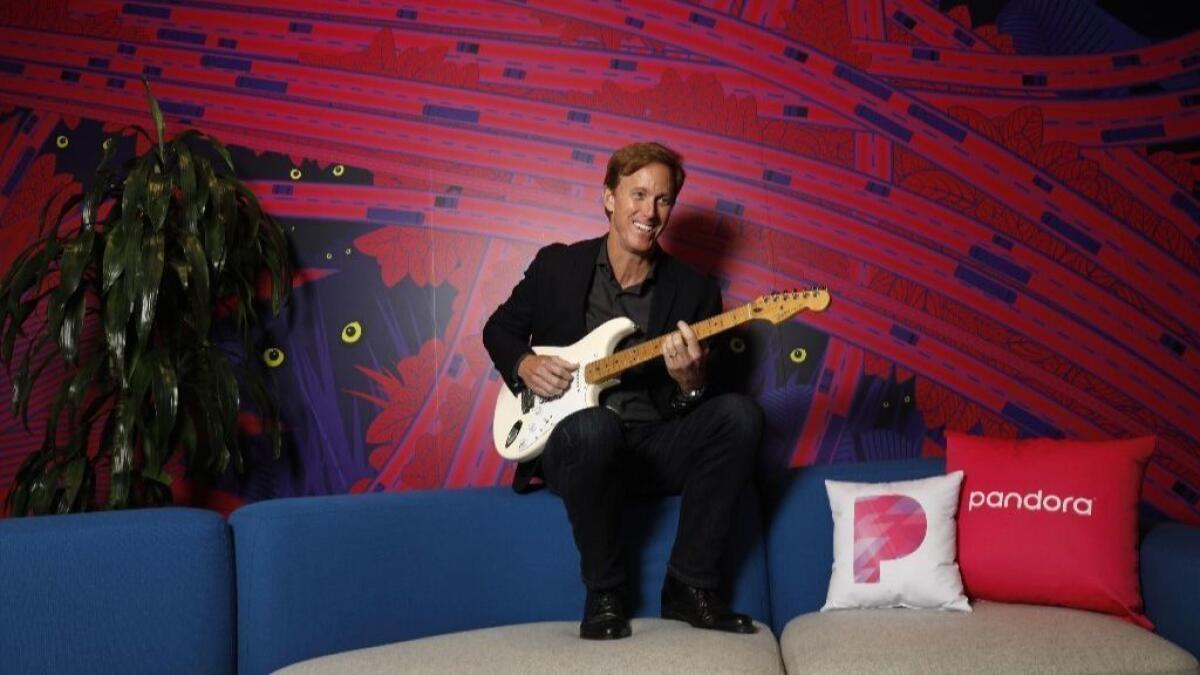How I Made It: Pandora’s Roger Lynch moonlights as a guitarist in a CEO-filled rock band

- Share via
Roger Lynch is chief executive of Pandora, a music streaming service based in Oakland.
He took over the company in September, tasked with leading it through the uncharted waters of the evolving streaming industry. Pandora employs 2,000 people across 26 offices and has about 74.7 million active monthly users.
An early start
Lynch began working when he was 10 and has held a job ever since. Delivering newspapers while navigating the snowy streets of Baltimore, and demolishing burned-down buildings with a sledgehammer never paid much, but Lynch recalls the experiences fondly.
“Work was always a part of my life. It came natural to me,” he said. “I saved everything, and whenever I had enough, I’d go buy a guitar.”
He still remembers his first one: a cheap electric model with green sparkles.
Musical influences
After his brother-in-law taught him a few Neil Diamond songs, he developed a lifelong affection for music that was instrumental in landing him his role at Pandora.
“Pandora is a company filled with music lovers, and they can tell whether someone is a music person or not,” Lynch, 54, said. “It was important to the board to find someone with a genuine passion for music. They found that with me.”
Twists and turns
Although he was constantly forming bands, Lynch never envisioned himself in the music industry. He received a physics degree from USC before landing a job at Hughes Aircraft Co., an aerospace and defense contractor based in Westchester.
He spent a few years working on infrared missile systems, but eventually wanted a change. Soon enough, he found himself with an MBA from Dartmouth and an investment banking gig with Morgan Stanley.
That would turn out to be the last job where he wasn’t running the company.
More success stories from How I Made It »
Music is the perfect art form.
— Roger Lynch
A new frontier
Lynch was enchanted with the vast potential of broadband and spent the next two decades at the helm of three internet companies: Chello Broadband, Video Networks Limited and, more recently, Dish’s Sling TV, which he grew into the largest over-the-top streaming service in the country.
“I’ve always liked industries in change, transformation and disruption,” he said. “I’m attracted to the challenges of applying technology in new ways to create new services.”
Facing the music
The job opening at Pandora represented an intriguing proposition for Lynch. On one hand, he’d be entering a familiar industry based around an art form he adored. On the other, his last three jobs were at companies he had built himself. Pandora was someone else’s brainchild.
“Walking into Pandora, I was the one who knew the least about it,” Lynch said. “When you build a company, you have the chance to create a culture and hire people supportive of that culture. This company had a very defined culture already.”
To conquer the learning curve, he spent his first two weeks on the job at what he called CEO boot camp, which consisted of 10-hour days with no breaks. He held interactive meetings with every branch of the company, exploring the nuances of the position and forming his strategy for the business.
Challenge accepted
When Lynch arrived, Pandora wasn’t on thin ice — but it was on ice. At the end of 2017, the service had lost roughly 8 million listeners year-over-year as competitors like Spotify and Apple Music carved out larger shares of the market.
One of Pandora’s greatest strengths is its Music Genome Project, a data tool that analyzes for 450 attributes in a song and creates an algorithm to categorize it into moods and playlists.
Based on that, Lynch decided the company’s two main goals would be to change the trajectory of listeners and improve technology for its advertisers.
“Pandora became successful at a time when there were few competitors in the industry,” he said. “With increasing competition, we have to understand our advantages and develop strategies that leverage those advantages.”
Backup gig
To keep in touch with his creative side, Lynch plays lead guitar in an all-CEO band called the Merger, along with Denver-based executives Mike Fries, Bryant Martin and Bob Deibel. The group tackles classic rock and R&B hits, as well as a few originals.
“It helps give me credibility, whether it’s with employees or the labels I deal with,” Lynch said.
Gone are the days of gigging in grubby garages. For its latest show, the band teamed up with the Colorado Symphony for a charity event in Denver.
Leadership lessons
When it comes to role models, Lynch suggests looking inward. He spent years looking for inspiration from others, but didn’t like the conclusion that to succeed, he needed to emulate someone else.
“I got into a leadership position at a young age and made a lot of mistakes,” Lynch said. “Trying to be like someone else isn’t a path for your own success. Craft your style based on your own strengths and weaknesses.”
For Lynch, that means surrounding himself with a team that challenges his ideas.
He doesn’t expect to be right on every decision, and when he’s wrong, he hopes others can speak up to create a dialogue. For him, good communication and strategy come before the need to be liked.
Personal life
Lynch lives with his wife in San Francisco and has three children, ages 22, 29 and 30. He spends his mornings on runs, and his headphones can usually be found blaring everything from Led Zeppelin to Marvin Gaye to the Mighty Mighty Bosstones.
Inside the business of entertainment
The Wide Shot brings you news, analysis and insights on everything from streaming wars to production — and what it all means for the future.
You may occasionally receive promotional content from the Los Angeles Times.








